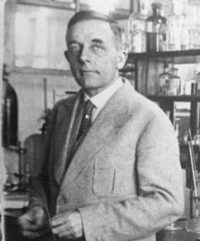Nobel Prize Winner, Dr Otto Warburg: On the Cause of Cancer

Dr. Otto Warburg discovered the real cause of cancer in 1923 and received the Nobel Prize for doing so in 1931.
Dr. Warburg was director of the Kaiser Wilhelm Institute (now Max Planck Institute) for cell physiology at Berlin. He investigated the metabolism of tumors and the respiration of cells, particularly cancer cells.
“Cancerous tissues are acidic, whereas healthy tissues are alkaline. Water splits into H+ and OH- ions, if there is an access of H+, it is acidic; if there is an access of OH- ions, then it is alkaline.”
In his work, “The Metabolism of Tumours” he demonstrated that all forms of cancer are characterized by two basic conditions: acidosis and hypoxia (lack of oxygen).
Lack of oxygen and acidosis are two sides of the same coin: where you have one, you have the other.
“All normal cells have an absolute requirement for oxygen, but cancer cells can live without oxygen – a rule without exception. Deprive a cell 35% of its oxygen for 48 hours and it may become cancerous.”
Dr. Warburg made it clear that the prime cause of cancer is oxygen deficiency (brought about by Toxemia). Dr. Warburg discovered that cancer cells are anaerobic (do not breathe oxygen)
and cannot survive in the presence of high levels of oxygen.
You can read more about Dr. Warburg here. And on his work here.
